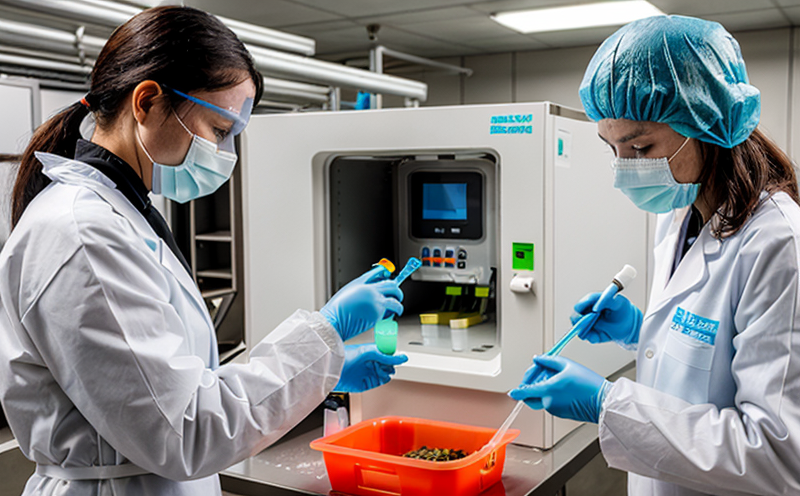ASTM D6975 Biofilm Formation Potential Test in Environment
The ASTM D6975 Biofilm Formation Potential Test is a critical method used to assess the potential for biofilm formation on surfaces within various environmental settings. This test is particularly important for industries where microbial growth can lead to significant issues, such as healthcare facilities, water treatment plants, and industrial processes.
The test involves exposing a surface to specific conditions that favor biofilm development, then quantifying the biofilm biomass after a set incubation period. The primary outcome is an understanding of how susceptible the material or surface under examination might be to biofilm formation, which can impact performance, hygiene, and operational efficiency.
Understanding this susceptibility allows for the selection of materials that are less prone to biofilm growth, leading to better product design and more effective maintenance strategies. This test is especially crucial in environments where biofilms could compromise safety or functionality, such as in medical devices, water distribution systems, and food processing equipment.
The ASTM D6975 method follows a standardized procedure that ensures consistency across different laboratories. It involves several steps: preparation of the test specimen, inoculation with a microbial suspension under controlled conditions, incubation over an extended period to allow biofilm formation, followed by biomass quantification using appropriate analytical techniques.
The use of this test is not limited to just one industry but spans across sectors like healthcare, food and beverage, water treatment, pharmaceuticals, and more. In the healthcare sector, for instance, it helps in understanding the potential for microbial contamination on medical devices and surfaces. For water treatment plants, it ensures that materials used in filtration systems are resistant to biofilm buildup, which can reduce efficiency and lead to operational disruptions.
The ASTM D6975 Biofilm Formation Potential Test is a valuable tool for quality managers, compliance officers, R&D engineers, and procurement teams. It provides insights into the long-term performance of materials in various environmental conditions, ensuring that products meet regulatory standards and perform optimally under real-world use scenarios.
- Healthcare Facilities: Ensuring medical devices remain free from biofilm formation to prevent cross-contamination.
- Water Treatment Plants: Selecting materials that resist biofilm growth in water distribution systems, enhancing operational efficiency and safety.
- Pharmaceuticals: Evaluating packaging materials for their resistance to microbial contamination.
- Industrial Processes: Assessing the durability of surfaces in high-moisture environments, like food processing equipment.
Why It Matters
The significance of the ASTM D6975 Biofilm Formation Potential Test extends beyond mere compliance with industry standards. It plays a pivotal role in ensuring that surfaces and materials used in critical environments are resilient to microbial growth, which can lead to numerous benefits:
- Improved Product Quality: By identifying potential biofilm-forming surfaces early in the product development process.
- Increased Operational Efficiency: Reducing downtime and maintenance costs associated with biofilm-related issues.
- Better Hygiene Standards: Ensuring that materials used in public spaces are less prone to harboring pathogens, enhancing safety for end-users.
- Regulatory Compliance: Meeting the stringent requirements imposed by regulatory bodies to ensure product safety and efficacy.
Biofilm formation can have severe consequences if not addressed properly. In healthcare settings, biofilms on medical devices can lead to infections, which are difficult to treat and can result in patient harm. In industrial environments, biofilm buildup can cause blockages, corrosion, and reduced effectiveness of equipment.
The ASTM D6975 Biofilm Formation Potential Test helps mitigate these risks by providing a clear picture of the biofilm formation potential of surfaces and materials. This information is invaluable for engineers, designers, and quality assurance professionals who are responsible for creating products that meet stringent hygiene and performance standards.
Industry Applications
- Healthcare Facilities: Ensuring medical devices remain free from biofilm formation to prevent cross-contamination.
- Water Treatment Plants: Selecting materials that resist biofilm growth in water distribution systems, enhancing operational efficiency and safety.
- Pharmaceuticals: Evaluating packaging materials for their resistance to microbial contamination.
- Industrial Processes: Assessing the durability of surfaces in high-moisture environments, like food processing equipment.
- Environmental Monitoring: Detecting biofilm formation on critical infrastructure like water treatment systems and industrial cooling towers.
Use Cases and Application Examples
The ASTM D6975 Biofilm Formation Potential Test is widely used in various industries to ensure product quality and operational efficiency. Here are some specific use cases:
- Medical Device Manufacturers: To test the biofilm resistance of catheters, surgical instruments, and other medical devices.
- Water Treatment Companies: To evaluate the effectiveness of filtration materials in reducing biofilm formation within water systems.
- Pharmaceutical Manufacturers: To assess packaging materials for their ability to prevent microbial contamination.
- Food Processing Plants: To ensure that surfaces in food contact areas are resistant to biofilm buildup, which can lead to spoilage and contamination risks.
- Environmental Agencies: To monitor the biofilm formation potential of materials used in environmental remediation projects.
In each case, the ASTM D6975 test provides critical insights into the performance of surfaces and materials under specific conditions. This information is essential for optimizing product design, enhancing operational efficiency, and ensuring regulatory compliance.





